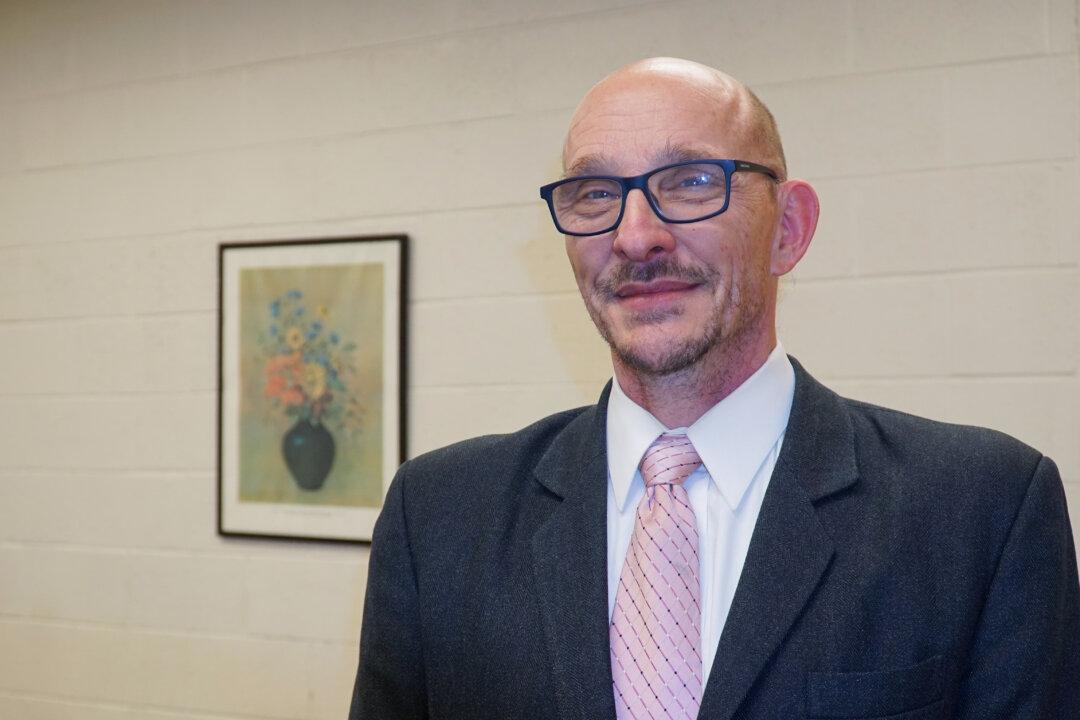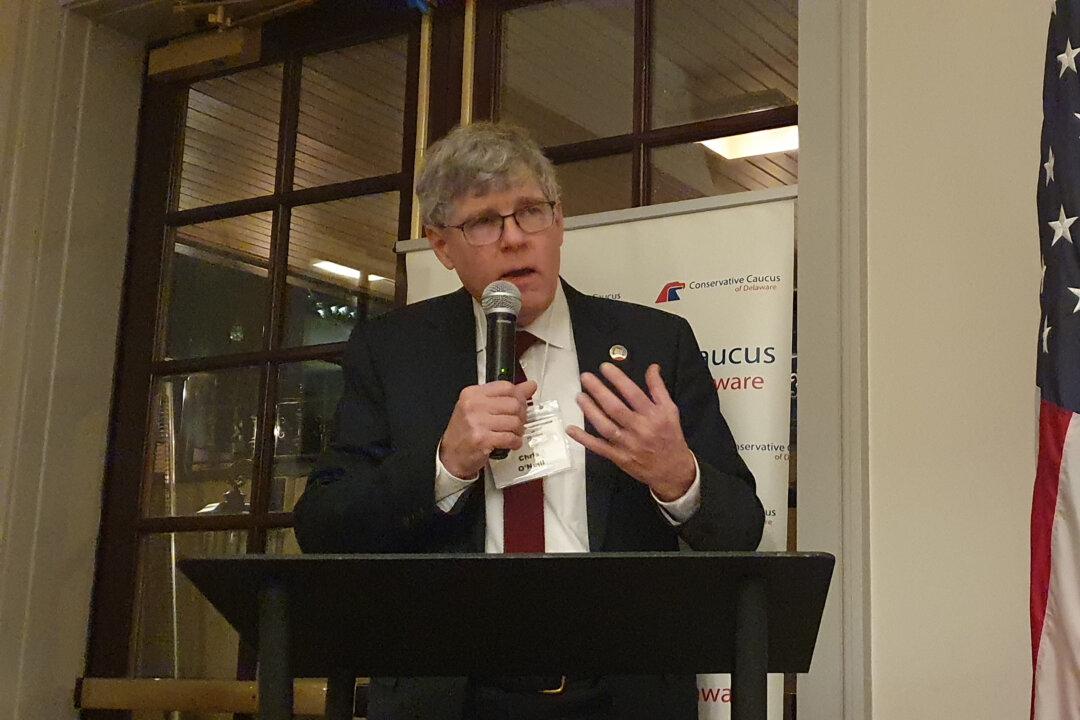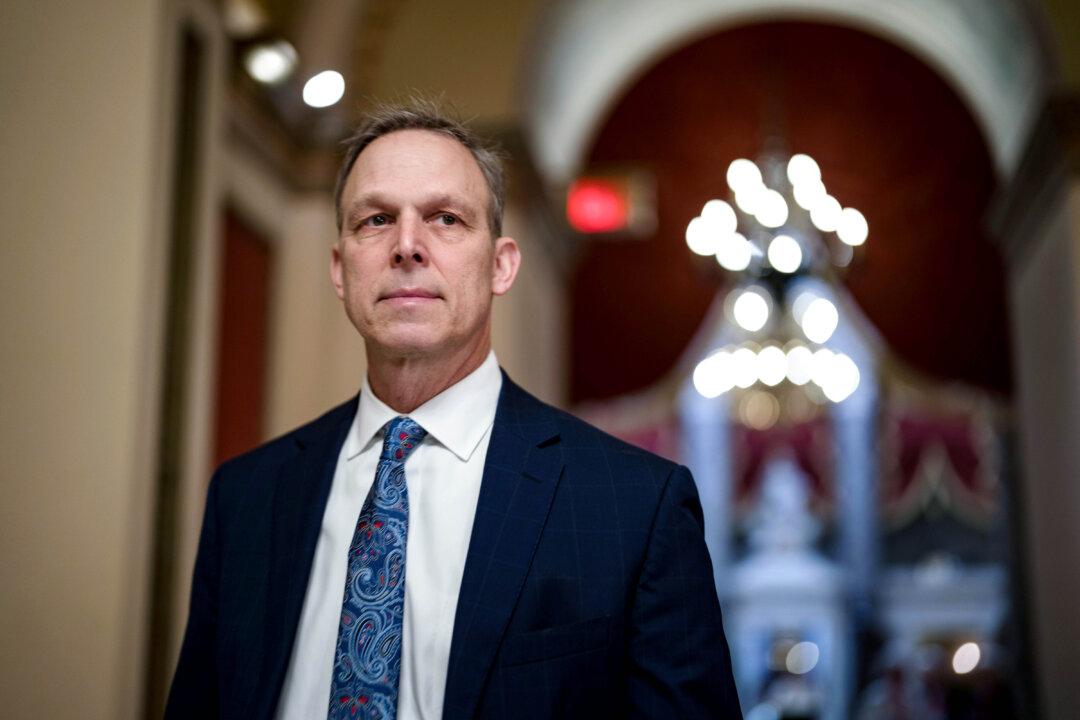PHILADELPHIA, Pa.— “I find great benefit for the public (to learn) what Mr. Li has written here,” said Mark Thomas, assistant professor of Political Science at La Salle University. “The philosophy behind Falun Dafa, or Falun Gong, actually is very helpful. It brings a great value to society.”
Thomas told The Epoch Times his comments after reading the article “How Humankind Came to Be” by Mr. Li Hongzhi four or five times on March 15. He found it very interesting, with many correlations with both Christian religious teachings and philosophical thoughts over the past thousand years.
Mr. Li is the founder of Falun Gong, or Falun Dafa, a spiritual practice that teaches the universal principles of truthfulness, compassion, and forbearance. Since its introduction to the public in the 1990s, it has spread to more than 100 countries.
Thomas believes Mr. Li’s article can “encourage people to be good” and “build a source of hope and direction. That is a discipline.”
“It’s like any sport or any academic study is a discipline. You need to discipline your mind, body, and soul. And discipline means accepting, to lift up the heavyweights in a gym, or pick up the deeper philosophical, religious thinking, really pushing against yourself, and make yourself strive for more,” said Thomas.
“And then, as you face the other types of earthly sufferings, you’ve already put yourself through the training. Likewise, in society, if you’ve got a good philosophy or good root when something bad happens, you can fend it off.”
Thomas thinks the most important thing he learned from Mr. Li’s teaching is “the value of struggle, and to struggle we become better. To the point of life, it is really to become good and stay good. And by staying good, we help both ourselves, but we also help our families, we help society.”
No Pain, No Gain
Thomas thinks the whole idea of Mr. Li’s explanation about the role of striving on Earth is very important.“In this level of creation on Earth, there is this inherent evil coming from free will and original sin. That creates suffering on Earth. Not that the creator in either sense wanted suffering. But suffering is part of the existence here on Earth. There is no getting around suffering on this Earth,” Thomas continued.
“We know why it is because humans are bad and the world is imperfect. But the sufferings that come with it, we can use to perfect ourselves. It’s like going through physical training. You know that old saying: no pain, no gain.”
He thinks that suffering allows people to improve themselves, and allows others to show their goodness and move forward.
Thomas understands that suffering is actually purifying in every sense in Christian thought, or in Mr. Li’s thought. “If we view strivings on Earth as a way to improve ourselves, we can take actually joy in the suffering which sounds kind of counterintuitive. It allows us to get out the impurities.”
Thomas commends Mr. Li’s philosophy: “We shouldn’t be striving for riches or for honor, for their sake. Those are the rewards if we get them, of our intent become pure.”
He believes Mr. Li’s philosophy that even if you live a good life, you will lose if you’re involved in things that are sinful, such as gambling, sexual promiscuity, or whatever else detracts from your wealth.
“If you stay focused on pure thoughts and doing good to others, naturally, things will come, which will improve your wealth, your honor. And you don’t do it for that sake. You do it just for the sake of being a good person, not for the sake of getting rich or having honors,” Thomas added.
A Moral Anchor
Thomas thinks people nowadays are adrift from better nature in earlier centuries. “We’ve become much less focused, and much less morally grounded over the past several centuries, when society puts itself adrift.”He said even the ancient Greek philosopher Plato worried about the dangers that come with freedom. People confuse freedom with licentiousness.
“Freedom is wonderful if you use it within the bounds of a moral philosophy or a moral anchor,” said Thomas. “Without that moral anchor, and this has played a thought as well, you need something where you see the truth, the true vision of what is really consistent across societies. I think in Mr. Li’s thought. He brings out that we have common values across cultures and across races.”
“Mr. Li says that’s part of our nature. We just have to overcome that free will, that original sin, to build a better life, to build ourselves into a better society. And then, probably the bigger point is that you need a moral anchor. And Mr. Li’s philosophy, along with other philosophers, is very consistent with that,” he continued.
“You see decadence and debauchery in various forms in Western society, maybe even in parts of Eastern society, as an import from Western ideas. And I throw Marxism and communism in that same category.”
“When you throw out a moral anchor, and you get rid of the notion of a higher being, move towards atheism, you lose your moral anchor. Without that moral anchor, things drift toward evil. And people themselves drift towards evil to their own ends, and then they get confused,” Thomas added.
Plato’s Analogy of the Cave
Thomas encourages people to be more open-minded, to listen to all the ideas, then to figure out which one will keep them on the right path.He gave an example of Plato’s analogy of the cave. In the cave, some people have never seen the outside world. And they think that reality is shadows cast on the wall by puppet masters. One of them leaves the cave and sees the truth. He goes back down to tell people about the truth but is persecuted by the other people who are still looking at shadows and images.
“I often ask my students who are the puppet masters. And I'll be the first to say, well, the media, or politicians or teachers can cast false images of what is real society,” said Thomas. “Because society tells us that’s reality, forget what is real. The shadows are what’s real. And that’s not necessarily the case. We are looking at distortions of reality.”
He thinks Mr. Li has pointed out the essence of reality.
“What is actually real is what we’re trying to strive to become, not what will keep us here grounded in a temporally limited world. It’s not reality. Reality is what existed prior to the creation of this earthly realm. We'd have to figure out what that is and what the creator’s intent is. We know that Mr. Li points to the creator’s intent.”
‘Well-Timed’
Mr. Li published his article just before the Chinese New Year, the Year of the Rabbit. Thomas thinks it’s well-timed.“I'd say well-timed with the associate that a lot of concerns [in] our society right now about the future. I’m sure within even the Christian community, there are some concerns about the end of the world coming, climate change, and potential wars between countries, and we see the war erupting between Russia and Ukraine. There are sure a lot of concerns out there,” he said.
After reading Mr. Li’s article, Thomas shared his feelings: “My first thought was, how much it resonated with other thinkers’ thoughts? And then really how much it was accurate of fears existing within a society.”
He thinks nowadays, people are full of fear of what will happen in the future and what the future will bring.
“Nobody wants to think that this world will end and destruction. Everybody wants to think that, at least for their children, saying that the world will last forever,” Thomas said. “I remember when I was told as a youth that by the time I was this age, the world would come to an end. It’s like I won’t have my chance to make improvements.”
After reading Mr. Li’s article, Thomas sees hope and believes that good people will have a good future.
Plans to Add to His Teaching
Thomas said his students had asked him why they read so many Western thoughts. He is considering introducing Mr. Li’s article in his teaching next semester or next year.He said that probably scared the Chinese Communist Party. “They don’t want to know that people in the U.S. could share values with people in China, where you threaten their existence as a regime.”
Thomas said he and his students are well aware of how evil the communist regime is. “I’m aware of what they’ve done with the Uyghurs, dealing with Falun Gong, anybody that opposes, and what happens in Hong Kong or Taiwan. I know that Falun Gong and Uyghurs are both a huge target, these people who are hated by the Communist Party.”
Thomas said his family was very Protestant. In his early youth, he was going to become a Protestant minister. Then he saw the politics within various churches, that human element to fighting against each other, despite what people claimed to be.
“I thought, well, if I’m going to study politics, let me do it in the political realm, a non-religious realm where I'd want to still keep my faith. I was told way back if I regret not becoming a minister, but I’ve considered being an educator as being a minister too,” Thomas said.
“Being an educator helps you take a whole group of children, and you watch them grow.”




